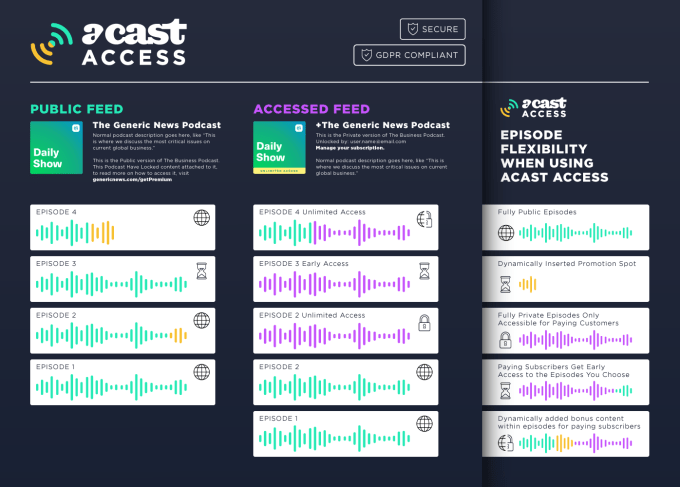Podcast monetization company Acast is launching a new way for publishers to put their podcasts behind a paywall.
Until now, podcasts have not been well-suited to subscription paywalls, due to the fact that they’re distributed via RSS feeds that can be accessed by any podcast player. So instead we’ve seen workarounds like Substack building a web-based audio player and TechCrunch releasing all our podcasts free while putting transcripts behind the Extra Crunch paywall.
And then there’s Luminary, the subscription podcast app that’s faced serious backlash for including unaffiliated podcasts in a way that some podcasters suspect it was re-hosting their audio files. (The company says it wasn’t doing that.)
With Acast Access, on the other hand, publishers should be able to create versions of their podcasts that are only available to subscribers, but are still accessible from any app.
Chief Product Officer Johan Billgren said that Acast works with a publisher to create two different podcast feeds — the public feed, which is available to everyone for free, and the “accessed-RSS” feed, which should include all the public content but also extra episodes, episodes released early or episodes with additional bonus content inserted.

Billgren demonstrated the listener process for me, showing how a subscriber could log onto a publisher’s site, visit the podcast page and then click a button that will allow them to subscribe to the paid version of the podcast, choosing the podcast app of their choice. Once you’ve subscribed, you should be able to download and play episodes anytime you want, without any additional login.
Behind the scenes, Billgren said Acast is checking anonymized user data against the publisher’s API to confirm that you really do have permission to access the feed. And apparently it can still cut you off after you cancel your subscription.
Initial Acast Access partners include the Financial Times and The Economist. While it makes sense to launch with larger publishers who can incorporate this into their existing subscription paywalls, Billgren said Acast will also be making this available to smaller partners in the comings months — they’ll be able to release podcasts behind Acast’s own subscription paywall. (The company has already been experimenting with paid content through its Acast+ app.)
“Basically, we want to reach the point where it’s a natural thing to say, ‘This is the public version [of a podcast], press the link to get access to the accessed version,'” he said.

No comments:
Post a Comment